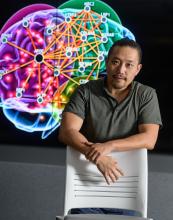
Rui Chang, PhD
Contact:
Dr. Chang is an expert in predictive network modeling and developed several cutting-edge probabilistic network modeling approaches, including the innovative top-down & bottom-up predictive network, which integrates the top-down networks with the novel bottom-up causality inference engine. The top-down & bottom-up predictive network modeling platform integrates multi-omics data to construct complete causal, predictive network model, which supports in-silico phenotypic prediction under various conditions and perturbations to capture network states that are driving disease as well as network state that reflect wellness and healthy, and to discover biomarkers and therapeutic targets to navigate between these states. This platform will afford a fast, cost-efficient and high-throughput in-silico screening, thus providing a way to rapidly prioritize targets for drug discovery programs and biomarkers for prognosis prediction, which offers significant advantages over the other types of approaches being taken today.
Since 2017, Dr. Chang were awarded multiple PI R01s and has successfully applied his novel computational method to build multi-scale, predictive and causal network models for Alzheimer’s Disease and has identified therapeutic targets across the board in AMP-AD consortium by NIH. To date, Analysis of post-mortem brain samples of both AD patients and non-AD subjects in AMP-AD consortium via this approach has identified and prioritized 6,395 de-novo drug targets (both genes and proteins) found in various brain regions and cell types in the CNS (i.e., neurons, microglia, astrocytes) associated with ADRD. The top-100 drug targets have been published on the AMP-AD knowledge portal. A total of 667 biological pathways were enriched by these targets including both experimentally validated and novel pathways including, but not limited to mitochondrial function and phagocytosis. Dr. Chang also developed an in-silico pipeline for drug repurposing and small-molecule screening using FDA-approved drugs, natural product compounds and small molecule libraries against these targets. This strategy led to prioritization of 3,092 FDA-approved drugs, natural products, and novel small molecules that could interact with our 6,395 targets. To validate these compounds, we tested neuroprotective effects and stimulation of phagocytotic activity for the top-ranked 170 (out of total 3,092) potential drugs using a focused in vitro screening approach in collaboration with Arizona Drug Discovery Center.
In addition, Dr. Chang has successfully applied his methods to model various biological systems and diseases, including human induced pluripotent stem cells (iPSCs) and insulin resistance and melanoma. Dr. Chang has published in top-tier journals such as, Cell Stem Cells, Nature Medicine, Cancer Research, Clinical Cancer Research, Brain, Nature Communications, and Science.

